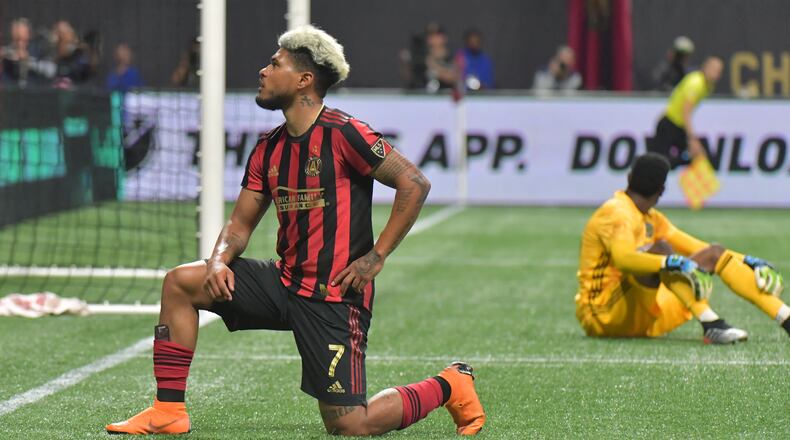Josef Martinez has scored 77 goals in 84 MLS games. If we add various cup competitions, his total for Atlanta United is 90 goals in 103 matches. That’s a goal every 1.14 games. By way of comparison, Lionel Messi has averaged a goal every 1.18 games, Cristiano Ronaldo one every 1.34 games. This isn’t to say Martinez should be ranked ahead of those Galacticos — before coming here, he worked three seasons for Torino of Serie A and averaged a goal every 5.78 games — but it is to say this:
For Atlanta United, Martinez has been the Ronaldo, if not quite the Messi. It managed 198 goals in regular-season play over its first three years of existence; Martinez scored 38.9 percent of those. Over all competitions those three years, the second-, third- and fourth-leading scorers for Atlanta United were Miguel Almiron, Hector Villalba and Julian Gressel, all now gone. Their total of 84 goals were six shy of what Martinez mustered by himself.
He wears No. 7, but for this franchise he has been the classic No. 9, as the soccer numeration goes. The biggest names — Messi and Ronaldo — are classified as forwards, meaning they can score goals but also create for others. From Day 1 of Year 1, Martinez has been the target man, the striker. This isn't to say that, with him lost to a torn ACL, Atlanta United will go scoreless in his absence. This is to say they have next to no hope of scoring at their usual rate.
Ezequiel Barco and Pity Martinez, pricey Argentinian imports, are gifted players. They're attacking midfielders who sit just behind the striker. (Almiron did the same.) It's possible one could function as an emergency No. 9. Someone must. The only other forward on the roster is Adam Jahn, a 29-year-old journeyman who hasn't scored an MLS goal since 2017. He's is 6-foot-3, a target man for crosses into the box. He's not to be confused with the dashing J. Martinez.
The recurring image of Atlanta United’s first three seasons is of a team that gains possession and tears off goalward. There was always someone making a wide run, always someone looking for the long diagonal ball, always Josef Martinez flying down the center. It was breathtaking to watch, and it was, it must be said, the way Darren Eales and Tata Martino drew this up. They didn’t build their expansion club to defend. They wanted a club of roadrunners. They got exactly that, and they got more, too — record crowds on a continuing basis and, in December 2018, the MLS Cup.
Martino then left to coach Mexico. He was replaced by Frank de Boer, whose coaching manual is rather different. The new man is Dutch, and the Dutch invented possession football and even exported it to Barcelona, where the system of short passes became known, not always fondly, as tiki-taka. For de Boer's Atlanta United, there was less road-running.
There was still Martinez, though. In 2018, he scored 27 of their 70 regular-season goals; 2019, he scored 27 of their 58. Last year’s second-leading scorer was Gressel, with six. Martinez had twice as many shots on goal as anyone else on the roster. He had seven game-winning goals. Second place belonged to Pity Martinez, with two.
Enough with numbers, weighty though they are. Question is, can Atlanta United win an MLS Cup without Josef Martinez? The answer’s almost certainly no, the hedging coming because soccer is the weirdest of games. (Sample score from Saturday: Watford 3, Liverpool nil.) There’s still enough healthy talent to make the playoffs, and an in all-knockout tournament, which MLS now has, anything can happen. Thing is, the healthy talent might need to play a different way.
Not an out-and-out parking of the bus — wherein you station everyone in front of your goal and dare the opponent to find a way though — but a more measured approach than the ol’ get-it-and-go. A few years ago, we saw league titles won by teams that essentially ceded possession and subsisted off counterattacks: Leicester City and Chelsea in the Premier League, Atletico Madrid in La Liga.
The catches here, however, are surely deal-breakers. Would a de Boer team ever be willing to fall back and wait for the opponent to mess up? Would Barco and Pity be content to bide their time? Would Atlanta United fans, who’ve turned out in force to support attacking football, sit still for a series of drab tactical exercises?
This franchise was, ahem, born to run. Its best runner is set for knee surgery. There are, to be sure, different ways to win a soccer match. (Atlanta United lost the Eastern Conference title game to Toronto, which took four shots to the loser’s 19.) There’s a chance de Boer will re-deploy Barco and Pity as tandem strikers, but then you wonder: With them out of midfield, who supplies the ball?
The cold reality is that Atlanta United’s season changed on a chilly night in Nashville. This has never quite been a one-man team, but Josef Martinez was always first among equals. Maybe he’ll return near season’s end — the soccer calendar runs forever — but the best-case scenario has him missing six months. In the interim, all Atlanta United can hope is to win enough to stay in playoff contention. The top seven teams in the 13-team Eastern Conference qualify. That might be do-able.
About the Author
The Latest
Featured



